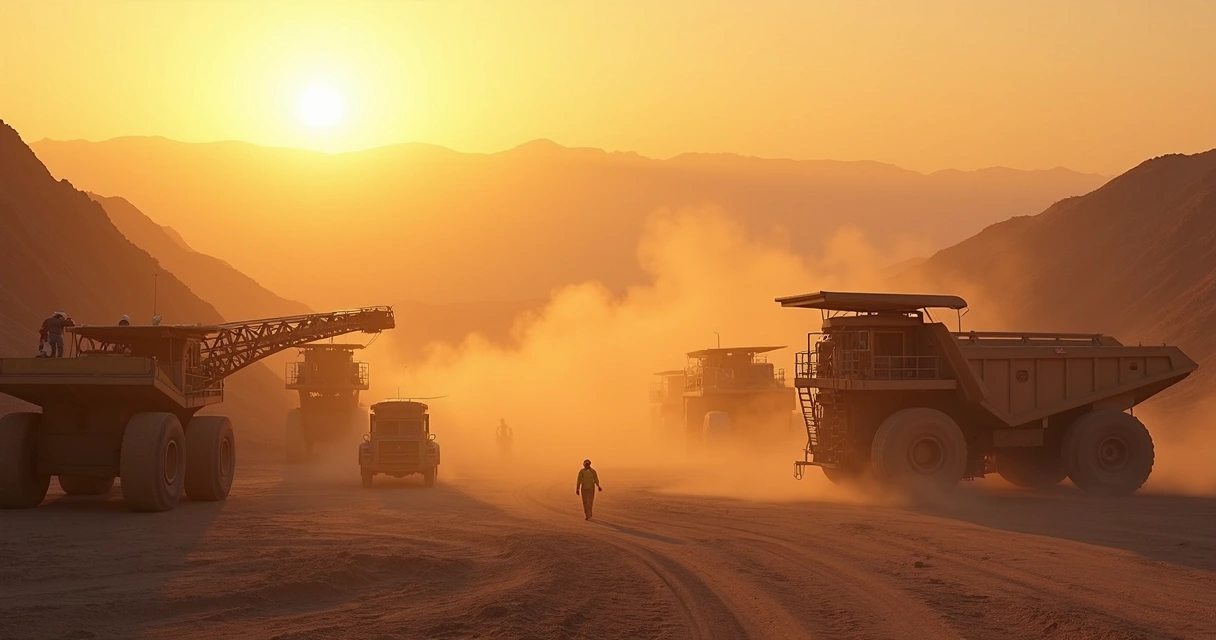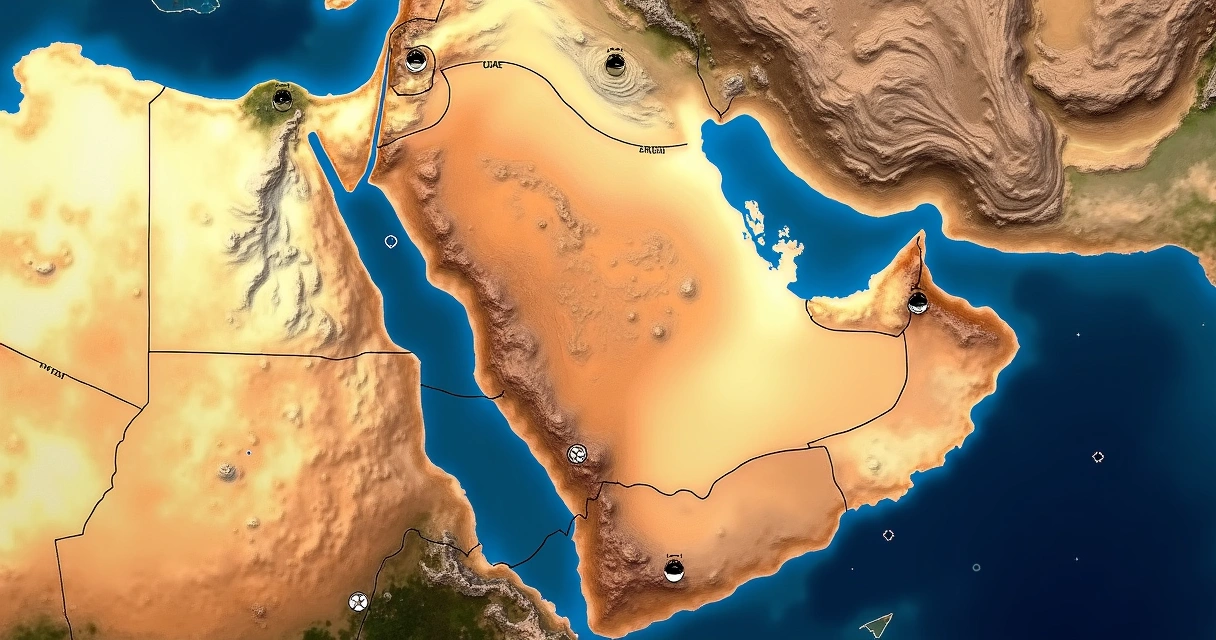Stepping into the Saudi Arabian mining sector feels much like standing at the edge of a vast, sun-baked quarry—blocks of opportunity stretch out for kilometers, their edges sharp and promising, but not without risk. For multinational mining companies, this is both an invitation and a challenge. Saudi Arabia’s Vision 2030 has thrown open the doors to global investors seeking a share of the country’s mineral wealth, yet the journey from ambition to reality is far from simple.
You might think, “What does it really take to build a successful mining workforce in this shifting, ambitious landscape?” The answer seems simple at first—hire talent, keep operations compliant, move teams where the seams are richest. But beneath that simplicity is a labyrinth of regulations, cultural differences, labor laws, and logistical hiccups.
Enterprise Workforce Solutions (EWS) steps into this complexity, connecting the dots as you pursue growth in the region. Let’s trace the story of how employer of record (EOR) solutions, especially those crafted by EWS, can shape your success in Saudi Arabia’s mining sector—and why timing, compliance, flexibility, and local expertise matter as much as engineering know-how.
Saudi Arabia’s mining ambitions are no secret. What once seemed like a quiet corner of the world’s resource map has quickly become one of its most eagerly charted territories. Ongoing government initiatives, huge mineral reserves, and an economic diversification push create a landscape full of possibility, perhaps even urgency.
Saudi Arabia wants to be a world leader in mining.
Evoking that vision, Saudi authorities have introduced policies meant to attract investment while backing up those policies with hard numbers. The General Authority for Statistics’ quarterly register-based labor market statistics for Q1 2025 show just how fluid this market remains: overall unemployment rate at just 2.8%, with foreign direct investment inflows reaching SAR 22.2 billion. Mining—specifically metals, rare earths, and industrial minerals—is positioned as a growth sector with high potential.
But entering the market is the first step. Staying there, scaling, and building agility across borders is the real test. Saudi Arabia’s labor environment is carefully regulated, with distinct frameworks governing everything from Saudization quotas to expatriate employment processes. Overlooking any part of this can result in delays, penalties, or—in the worst case—project shutdowns.
The complexities facing global mining operations can be subtle or striking. If you’re already managing projects on multiple continents, you likely know the story well. But Saudi Arabia does have its own twists. Here’s why EOR arrangements stand out as one of the main answers for multinationals seeking long-term stability.
Companies often try to build the right team quickly. Yet, the subtle, shifting rules around expatriate employment pose a constant risk. EWS knows that with the stakes this high, cutting corners isn’t an option.
Employer of record isn’t just jargon. It’s a framework that lets a mining company expand operations into Saudi Arabia while a specialist—like EWS—assumes responsibility for legal employment, contracts, payroll, benefits, and compliance. In practical terms, an EOR acts as the legal entity employing your staff in-country. Your people, your strategy, but our paperwork.
EOR means fewer headaches, more progress.
For mining, this matters even more. Drilling teams might need to move between sites. Environmental engineers may come from several continents. When every contract, permit, and payroll cycle carries its own regulatory demands, you need a process that doesn’t slow things down every time you pivot or scale.
Strict labor codes—regarding contracts, hours, social insurance contributions, Saudization, and more—demand attention to detail. Some requirements can shift depending on industry updates or government incentives. A mining company looking at a short-term permit in Tabuk may face different hurdles than one developing a long-term copper concession in the Eastern Province.
Saudization, for example, sets the balance between local and foreign workers, but also breaks roles down by function and wage, creating layers of reporting. And the penalties for non-compliance? Not theoretical. Enforcement is real, often sudden, and always costly if you slip up.
EWS’s EOR services provide a buffer here. Contracts, employment documentation, payroll tax deductions, and benefits administration are all managed by experts with up-to-date local knowledge, freeing up your focus for the site itself. When labor code changes, EWS adapts accordingly—keeping your compliance steady.
 Payroll, benefits, and multi-currency management
Payroll, benefits, and multi-currency managementMoney matters are famously complicated in cross-border mining projects. Payroll cycles must account for local tax withholding, different pay grades, overtime practices, and sometimes multiple currencies. Add variables like night shifts, hazardous site allowances, or international bonuses for project leaders, and the risk of error doubles.
EWS’s payroll outsourcing for Saudi Arabian mining operations handles these moving parts. That includes compliance with Saudi General Organization for Social Insurance (GOSI) rules, paid leave, and end-of-service benefits mandatory in the Kingdom. Our system is built for remote workers, freelancers, and traditional hires—so you don’t have to worry about mismatched payment cycles or time-consuming transfer approvals.
Reliable payroll pays for itself.
There’s also the human side. Mining teams expect clear, timely payment, health insurance, and logistical support. By centralizing this, EWS helps head off disputes before they happen.
When your core workforce comes from every corner of the globe, moving people into and across Saudi Arabia is a constant operation. Immigration paperwork, residence permits, and family visa handling come with ticking clocks. Miss one requirement, and your main shaft delays, not by hours, but days or weeks.
EWS global mobility solutions turn relocation into a repeatable process. Teams arrive with the correct visas, medical clearances, and insurances sorted out. We manage everything from pre-arrival documents and security checks to ongoing renewals. By managing the whole timeline, we make sure your engineers, geologists, and technicians are on-site, not stuck in transit.
 Company formation vs. EOR for market entry
Company formation vs. EOR for market entryYou may wonder if you need to set up a wholly owned subsidiary or branch before you can start hiring in Saudi Arabia. Sometimes, the answer is yes—if your long-term strategy is to have a permanent base. But for many multinational mining projects, the up-front time and legal compliance involved in registration (plus capital requirements, ongoing filings, and audits) can make progress painfully slow.
Here’s where EOR truly stands out. With EWS as your partner, your projects can get off the ground while the foundational pieces of your company formation are still in motion. This “parallel track” approach lets you meet local hiring quotas and compliance requirements right away, then transition to your own entity if the project scope grows.
You’re not locked in. EWS adapts. We’ve seen clients start with EOR, shift to company formation when the time is right, and do it all without breaking stride.
Saudi labor law, payroll taxes, and social contributions change with little notice. Industry-specific rules for mining safety, hazardous locations, and union relations can also crop up, impacting your employment terms almost overnight. Success depends on tracking these micro-changes—or partnering with a team like EWS, who does it for you.
EWS continuously reviews Saudi Arabian legal frameworks and immediately applies changes to the contracts and payroll structures managed for our EOR clients. We draw on labor market statistics to anticipate regulatory trends, making sure your projects remain steady.
Another factor to consider—GCC labor integrations. If your mining operations reach into UAE, Oman, Kuwait, or Qatar, EWS offers “one-door” guidance on each step, using region-wide expertise. This means a single partner—and a single process—for your entire regional workforce, rather than dealing with fragmented or conflicting approaches.
Imagine a global mining company setting up a pilot project on the edge of the Arabian Shield. Their executive team needs to onboard 30 engineers, technical support, and field analysts—all before the rainy season. Saudi authorities demand contracts, GOSI registration, and proof of compliance with labor codes before approving site activity.
By working with EWS’s EOR services, they are able to:
Within days, the site goes live. No compliance issues, no payroll interruptions, and no missed deadlines. As the project grows, EWS updates Saudization reporting and even advises on company formation options, so the mining firm keeps control of its expansion without new delays or extra bureaucracy.
With the right partner, mining projects don’t stumble—they accelerate.
Modern mining is digital. Sensitive geological data, intellectual property from R&D, and thousands of employment records require rigorous IT security. EWS builds its EOR and payroll systems with industry-standard encryption, robust authentication, and frequent audits—key for IT and cybersecurity managers tasked with protecting critical assets.
The goal is not just to process paperwork but to give you peace of mind that every detail is protected. Especially when dealing with high-value projects, the cost of even a minor breach can be huge.
 Training, safety, and cultural onboarding
Training, safety, and cultural onboardingMining is people-first. Strong training, local integration, and clear safety protocols are as important as machinery or geological surveys. EWS ensures all documentation—training records, certifications, and safety briefings—fit both Saudi standards and internal compliance needs for international mining firms.
Integrating expatriates into the local work culture takes sensitivity. Respecting prayer times, understanding holidays, and adapting shifts—these are subtle, but matter every day. EWS uses its Saudi-based staff to deliver targeted onboarding that preempts conflict and strengthens morale. That way, your site stays productive, secure, and ready for whatever comes next.
As mining firms succeed in Saudi Arabia, eyes naturally turn to neighboring markets. United Arab Emirates (UAE), Qatar, Kuwait, and Oman share similarities but each bring unique regulatory rules, company set-up hurdles, and workforce requirements. EWS offers broader EOR coverage, harmonizing your compliance and HR strategy across borders.
You can find more about our full scope on these regional offerings here:
This “regional visibility” makes it easier for mining groups to pool resources, shift talent to where new opportunities open, and maintain labor compliance as each jurisdiction refines laws in response to new discoveries or regional policies.
 Partner management and relationship building in mining employment
Partner management and relationship building in mining employmentManaging partnerships with local authorities, labor boards, and site-specific stakeholders is sometimes overlooked in technical projects. But for HR directors and partner management leads, these relationships can be the difference between progress and delay.
EWS acts as a steady point of contact—translating international standards into local requirements, advocating your case with government departments, and ensuring clear, regular communication with every employment-related partner.
Relationships drive momentum in mining.
EWS’s experience means that when challenges arise—unexpected labor inspections, new documentation requirements, or dispute resolution—you have a local partner at your side, ready to act.
Saudi Arabia’s minerals sector, shaped by Vision 2030, won’t stand still. With each ore discovery and infrastructure build-out, new opportunities arrive—but so do new regulations, expectations, and competition for the best talent.
EOR solutions like those driven by EWS adapt as quickly as the market itself. By managing the “how” of workforce compliance, payroll, and mobility, we allow mining companies to focus on their main goals.
Maybe you recognize this journey already. Or perhaps you’re just sketching first steps onto the Saudi map. Either way, connecting the dots is what EWS does best—from first hire, to corporate setup, to seamless regional growth.
EOR isn’t just an operational shortcut. For mining companies in Saudi Arabia, it’s the difference between worrying about red tape and digging into the real work. EWS brings clarity, control, and trusted expertise when your project—and your reputation—are on the line. From payroll and compliance to onboarding and mobility, we bring peace of mind so you can unlock value beneath the surface.
Build the team that will build your mine.
If you’re planning your next move in Saudi Arabia’s mining sector, it’s time to partner with a workforce solutions expert who understands not only the region, but the realities of your industry. Contact EWS to discover how we can help your company grow, adapt, and succeed in the world’s most promising mining market.
Employer of record (EOR) for mining companies is a service where a third-party like EWS acts as the legal employer of your mining workforce in Saudi Arabia. This arrangement allows your firm to hire staff locally without setting up a separate legal entity. The EOR manages contracts, payroll, compliance, benefits, and statutory obligations. You direct the staff’s day-to-day activities while EWS takes care of the legal and administrative needs, making it simpler and faster to start operations.
EOR benefits mining firms by speeding up market entry, reducing complexity, and lowering risk. It means your company can quickly bring in local or foreign experts, test operations, or launch new projects without lengthy administrative processes. Specialists such as EWS ensure your workforce stays compliant with Saudi labor law, Saudization, tax, and payroll requirements. By delegating legal obligations, your own teams can focus on mining operations rather than paperwork.
EOR is not legally required, but it can be the most practical solution for multinational mining companies that do not yet have their own legal entity in Saudi Arabia. For pilot projects, early market studies, or urgent staffing needs, EOR lets you hire, pay, and relocate staff compliantly and quickly. If you decide to build a permanent presence in the Kingdom, you can later shift to a direct employment structure.
EOR service costs vary by the provider, number of employees, and complexity of compliance requirements. Pricing is often per employee per month. Some costs may also depend on required benefits, insurance, and payroll complexity. EWS is known for tailored, transparent pricing based on the unique needs of each mining firm so that costs are clear and predictable upfront.
EOR providers for Saudi Arabia can be found by consulting recognized workforce specialists such as EWS. If you want to compare detailed offerings and coverage, start by learning about EWS’s employer of record services for Saudi Arabia or contact us directly to discuss your requirements. EWS also covers the UAE, Qatar, Kuwait, and Oman for mining projects with broader regional ambitions.
Hiring in Morocco: North Africa’s Emerging Tech Talent Market
Hiring in Portugal: What You Need to Know in 2026
Global Mobility and EOR: How to Align HR and Immigration in 2026
Beyond China: Where Asian Companies Are Hiring in 2026
How Recruiters Use EOR to Win Big in Fintech Placements
Europe’s Freelancer Laws in 2026: When to Switch to EOR
Hiring in the Philippines: 2026 Guide for Global Employers
How Recruiters Use EOR to Unlock German Healthcare Placements
Hiring in Colombia: 2026 Compliance Guide for LatAm Expansion
Hiring in Türkiye (Turkey): 2026 Guide for International Teams
How Recruiters Use EOR to Handle Rapid Global Onboarding
Top 5 EOR Red Flags to Avoid in 2026
EOR vs Entity Setup in 2026: What Startups Need to Know
10 Things You Didn’t Know Your EOR Could Do
When to Use a Payroll Provider vs Full EOR in Global Hiring
January Compliance Watch: What’s Changing in APAC Labor Laws
Hiring in Turkey in 2026: Costs, Contracts, and EOR Options
Contractor or Employee? Compliance Risks to Watch in 2026
What’s Changing in European Payroll Compliance in 2026?
How to Use EOR to Win More Government or Public Sector RFPs
Hiring in Colombia: Fast-Growing Talent Pool, Low Total Cost
Remote Tech Jobs Surge 33% in Ireland: Skills You Need Now
Remote Work in APAC: 7 Data-Driven Trends for 2026 Expansion
Remote Payroll Headaches: 7 Mistakes HR Teams Make
Freelancer vs EOR in 2026: Cost, Risk, and Speed Compared
How Employee Experience Drives Retention and Business Growth
How HR Can Reduce Burnout Amid AI, Budget Cuts, and Change
Employment Contracts: What HR and Global Managers Must Know
PEO Explained: How It Simplifies Global Workforce Management
Global Mobility: A Complete Guide for HR and Global Managers
Remote Workforce: A Complete Guide to Managing Global Teams
Workforce Planning: A Step-by-Step Guide to Strategic Hiring
How Recruiters Use EOR to Increase Revenue Per Client
The Secret to Winning Global RFPs? A Strong EOR Partner
Top 7 Hiring Trends Shaping Global Teams in 2026
Hiring in Türkiye: Key Labor Laws and Employer Risks in 2026
GCC Hiring Compliance Update: What’s Changing in 2026
How to Hire in Turkey in 2026: A Strategic EOR Guide
Why modern recruitment agencies outsource compliance to EOR partners
How adding an EOR partner helps agencies win more RFPs
EOR Opportunities in Poland: Why It’s Europe’s Talent Powerhouse
Cross-Border Hiring Trends for 2026: Insights for Global Recruiters
How to Build a Scalable Payroll Strategy Across MENA
Contractor vs Employee in Germany: What’s the Risk in 2026?
“Place globally, bill locally” — the new recruiter cheat code
Top 5 Compliance Mistakes When Expanding to the UAE
Why EOR is Key to Winning Public Sector Tenders in Europe
Growth formula for agencies using EOR to expand key accounts
How EOR helps recruiters stay ahead of fast-changing GCC compliance
Employer of Record in Mandarin: What is 境外雇主服务?
How to Use an EOR for Temporary Projects (中国公司如何为短期海外项目使用EOR服务)
Why “Go Global” Must Include Compliance (“走出去”战略中的合规盲点)
中资企业如何选择欧洲EOR供应商?(How to Choose the Right EOR Partner in Europe)
与当地政府打交道:中国公司需要了解的合规礼仪 (Cultural Compliance for Chinese Firms)
中国公司海外人力结构案例分析:制造业、科技与能源 (HR Case Studies: Chinese Firms Abroad)
How Guanxi Influences Hiring in the Middle East (关系在中东招聘中的作用)
Top 5 Risks When Hiring in the Gulf (中国企业在海湾地区招聘的五大风险)
Managing Compliance in Multi-country Projects (中国企业多国项目的人力合规管理)
The $100K Visa Shock: Why Global Hiring Just Replaced the H-1B
How to Set Up Payroll For Hpc And Ai Teams
Contracting Machine Learning Talent Abroad
Everything on Hiring Foreign Phds In German Tech Labs
Cross-Border Ip Protection In R&D Teams
How To Classify Freelancers In Tech Innovation
How Eor Helps Tech Firms Legally Hire In Germany
Dual Contract Structure For International Researchers
Data Protection Obligations For Remote Tech Staff
Germany Research Visa Vs Skilled Worker Visa
Everything on Nis2 Directive Compliance For Eu Tech Workers
Global Mobility For Deep Tech Startups In Germany
Payroll For EU Embedded Systems Developers
Relocation Support For Semiconductor Experts on EU
The Absolute Way to Hire Ai Engineers In Germany
How to Manage Benefits For German Tech Hires
Germany’S Blue Card Process For Engineers
Everything on Germany R&D Employment Compliance
Remote Hiring Of Cybersecurity Analysts In Eu
Visa Pathways For Quantum Computing Researchers
Onboarding Robotics Specialists Across EU Borders
Workforce Planning In Ai-Driven Logistics And Infrastructure
Visa Processing For High-Tech Infrastructure Staff
Managing Global Mobility In Sustainable City Projects
Cross-Border Team Management In Saudi Data Centers
Hiring Skilled Labor For Green Hydrogen Facilities
Digital Twin Technology Hiring Trends In Saudi Construction
Employer Obligations In Public-Private Energy Initiatives
Navigating Local Labor Laws For Solar Energy Teams
Talent Acquisition In The Saudi Mining Sector
Eor Solutions For Ai Engineers In Mega Projects
Regulatory Challenges In Hiring For Giga Construction Projects
Contractor Compliance In Smart City Developments
Classification Of Engineering Consultants In Vision 2030 Projects
How To Manage Workforce For Neom-Based Tech Projects
Eor For Multinational Mining Firms Operating In Saudi Arabia
Employer Of Record For Wind Energy Projects In The Gulf
Relocation Logistics For International Clean Energy Experts
Hiring Strategies For Large-Scale Construction Projects In Ksa
How To Onboard Digital Infrastructure Experts In Saudi Arabia
Payroll Setup For Renewable Energy Workers In Ksa
Strategic Relocation To Riyadh Or Doha: A Guide for Global Employers
Work Visa Processing In Qatar And Saudi Arabia
Qatar Nationalization Policy And Foreign Firms
Cost Of Setting Up A Business In Qatar: A Guide for Global Employers
Saudi Labor Court And Dispute Handling for Global Employers
Cross-Border Payroll For Ksa And Qatar Teams
End Of Service Benefits Saudi Arabia: A Guide for Global Employers
How To Manage Expat Benefits In Qatar for Global Employers
Expanding Into New Markets: Vendor Risks You Should Flag
A Guide to Cross-Border Equity Vesting for Tech Startups
Employer Branding for Multinational Teams: What Works Now
What Global C-Level Leaders Miss About Digital Nomad Visas
Succession Planning for Distributed Teams: A Practical Guide
Relocation Budgeting For Global Tech Firms
Latam Hiring Strategy: What Global Companies Should Know
Risk Of Permanent Establishment Explained
Managing Intellectual Property In Remote Work
Benefits Benchmarking Globally for Global Companies
How to Benchmark Compensation Across 100+ Countries in 2025
Checklist: Preparing HRIS for Fast International Scalability
Biometric Data in Global Payroll: Legal Boundaries Explained
8 Regulatory Updates Impacting Global HR in 2025
What are Hidden Costs of In-House Payroll?
Why Companies are Thinking Differently About Relocation
Is Your Global Mobility Program Outgrowing Spreadsheets?
Remote Work Visas: A Growing Trend in Global Mobility
Hiring in Europe Post-Brexit: What You Need to Know
Tips for Managing Multi-Time Zone Teams Successfully
Relocation Packages: What Top Talent Expects in 2025
Banking and Payroll Challenges in Saudi Arabia Markets
The Legal Risks of Misclassifying Global Workers
Why Scalability Should Drive Your Global HR Strategy
How EWS Streamlines Global Mobility for Tech Talent
Lithuania – Employer of Record
Kosovo – Employer of Record
Finland – Employer of Record
Namibia – Employer of Record
Nepal – Employer of Record
Spain – Employer of Record
Latvia – Employer of Record
Ireland – Employer of Record
Cyprus – Employer of Record
Czech Republic – Employer of Record
Italy – Employer of Record
Indonesia – Employer of Record
South Africa – Employer of Record
Tunisia – Employer of Record
Bosnia – Employer of Record
Moldova – Employer of Record
Five Tips For Improving Employee Engagement
Netherlands – Employer of Record
Germany – Employer of Record
France – Employer of Record
Portugal – Employer of Record
Bulgaria – Employer of Record
Austria – Employer of Record
Hungary – Employer of Record
Slovenia – Employer of Record
INCLUSIVITY IN THE TEAM MAKES EVERYONE WIN
Thailand – Employer of Record
Sri Lanka – Employer of Record
The Significance of an Employer of Record
Greece – Employer of Record
Mexico – Employer of Record
4 Reasons to Outsource Your Payroll
Five Recruitment Trends 2023
Malaysia – Employer of Record
Skill-Based Hiring and Benefits
Malta – Employer of Record
How To Practice Inclusive Recruitment
Israel – Employer of Record
Macedonia – Employer of Record
Jordan – Employer of Record
Macau – Employer of Record
Peru – Employer of Record
The Importance of Employer Branding
Bahrain – Employer of Record
South Korea – Employer of Record
Recruiting during a recession
Philippines – Employer of Record
USA – Employer of Record
Japan – Employer of Record
How To Setup A Business in 2023
Norway – Employer of Record
Managing Overseas Projects In 2023
Reason Of Expanding Your Workforce Globally
Croatia – Employer of Record
Colombia – Employer of Record
5 Ways To Speed Up Your Hiring Process
Egypt – Employer of Record
3 Ways To Streamline An Interview Process
Russia – Employer of Record
Saudi Arabia – Employer of Record
Hong Kong – Employer of Record
An Effective Hybrid Work Model
Turkey – Employer of Record
UAE – Employer of Record
Pakistan – Employer of Record
7 Things to Consider Before Accepting a Job
Kazakhstan – Employer of Record
3 Reasons to Encourage Employees to Generate Employer Brand Content
Denmark – Employer of Record
Sweden – Employer of Record
Bangladesh – Employer of Record
Kuwait – Employer of Record
How To Hire In The Age Of Hybrid Working
Australia – Employer of Record
Oman – Employer of Record
Qatar – Employer of Record
Ukraine – Employer of Record
Diversity – A Vital Hiring Strategy
Owning Every Moment of Your Hiring Experience
Serbia – Employer of Record
Maldives – Employer of Record
India – Employer of Record
Argentina – Employer of Record
Uzbekistan – Employer of Record
Belarus – Employer of Record
Brazil – Employer of Record
Chile – Employer of Record
Armenia – Employer of Record
3 Steps To Company Formation In The UK & Abroad
Romania – Employer of Record
Canada – Employer of Record
Morocco – Employer of Record